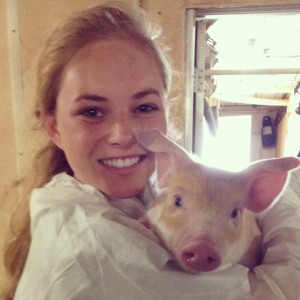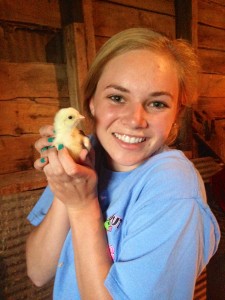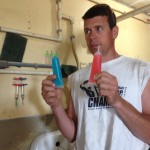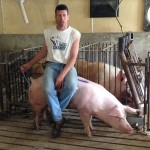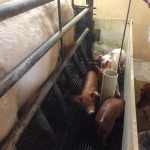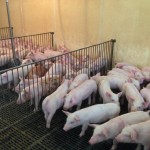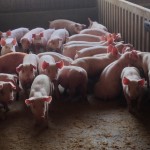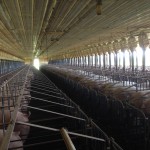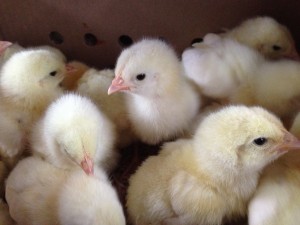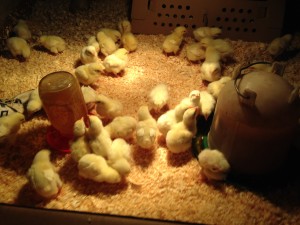This course has officially drawn to a close. I am the last one in the house, patiently waiting until it is time to leave for the airport. Since it is the last day, Scott was able to bring the guns back to the house—they had to be removed from the premises due to liability reasons—so he invited me to shoot some skeet with him. I thought I was remarkably good at it for only having done it once before, but then Scott admitted he was keeping it easy because he didn’t know how I would shoot. I had shot the first three in a row, but after Scott started throwing harder, I missed three in a row. Well, c’est la vie. Finally, as a last hurrah, I had to do a photoshoot as the awesomely stereotypical farmer image I can imagine. So, I present to you this photo:
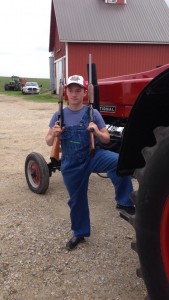
*Backstory: the second day I was at the farm, I sent a picture to all my friends with the image of the softly rolling farmland and windmills in our vicinity set against a pretty decent sunset. I accompanied the photo with the caption, “#Farmlife.” My actual-farmer friend replied back with his own photo of him and his brother posing with guns in their crop fields, also accompanied with, “#Farmlife.” I naturally had to out do him. That’s how the above picture was born.
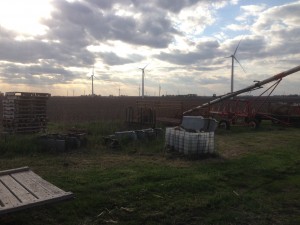
The photo that started it all. The original #farmlife
P.S. The tractor in the photo is Denny’s tractor-pull tractor. If you don’t know what that is, it’s basically drag racing for tractors where the competitors pull a large hitch with a sliding weight as fast as possible. Here is Denny in action at the 2011 Wright (Iowa) County Fair. (Notice how he runs into the fence at the end.)
http://www.youtube.com/watch?v=Nj4TgHb9RP0
This last post is supposed to be a final reflection on our experience, and what a great experience it has been. As Dr. HN said multiple times, an entire course or even a degree can be crafted around the subjects we tackled over three weeks. If this was offered as a semester course while at Furman, I definitely would have taken it.
My main goals for the trip were to learn more about the food system, gain a better grasp of the politics surrounding food and agriculture, and simply to learn what farmer life is like. Growing up in suburbia, the only exposure to farming I had were stories that some of my farmer friends–of which I had two or three–decided to share and what I had seen in documentaries or Discovery/National Geographic shows. If I saw anything in the media, it was usually related to the newest trend in agriculture or food, including organic gardening, non-GMO products, and sustainable agriculture. I did not know much about conventional agriculture.
If I had to take away one thing from the course, it would be how diverse everything really is. I am referring to the different views and opinions, different tastes, different farms, different farming methods, et cetera–from the Annette Sweeney’s to the Mary Mascher’s, Tabletop Farms to Summit Farms, and from Seed Savers to Monsanto and Dupont Pioneer. Everyone has a story. There are those in the middle who may or may not get too involved in the politics of food, such as our very own Denny and Scott Neubauer and their relatively modest conventional farm. And I definitely cannot forget about Dalona, our wonderful cook with an equally wonderful family!
Hardly any policy affects only a few parts of the population. Odds are that there are numerous indirect costs, benefits, and externalities. Therefore, there are many members of the public who have a stake in any potential change. (*Statistically speaking, the American public actually doesn’t hold complex views, much less know that a change in the status quo may be taking place or could affect them. Let’s assume differently for the sake of this post.) Hoping to go into politics when I establish myself in the job market, it would be my job to consider all the different actors who hold a stake in a particular policy decision. They will find their allies on a particular issue, form coalitions, present their ideas to the public and the government, and hopefully craft good policy. I would then do my part to help effect a change that I believe would better those affected, and especially in the case of Farm, leave the environment in better condition than before.
Farm covered many topics, most of which required a good deal of technical knowledge to fully comprehend. It showed me how vital it is for agriculture and food politics students to know the latest science being published academia as well as the circumstances on the ground. Some political battles, such as gay marriage or abortion, are arguably more ethically and morally based, whereas agriculture and food battles can be more scientific in manner—or at least, I think it should be. You have to be familiar with the geography and geology of the areas in question, what farmers are currently doing, the ability or willingness of farmers to change the system, and have to know the answers to numerous other questions. Then again, such topics as government regulations and jurisdiction are very ideological and prone to personal beliefs. Without any of this knowledge, you won’t know what you are likely to confront.
Finally, agriculture and food deal with some of the biggest questions that could affect the course of world history. Can we really feed the world? Can we do so and keep the environment healthy? Should we master nature or work within its most natural state? At this point in history, there are still many tradeoffs between efficiency and sustainability when it comes to feeding the world’s burgeoning population. Conventional farmers may not be willing to sacrifice more capital for the newest method that may not work, especially if it decreases the yield in the short term without presenting a clear long-term benefit. Many organic farmers, especially CSAs, sacrifice size, yield, and/or efficiency for organic certification or other demands of a specific market. Nonetheless, as has been stated by almost every farmer we’ve met, there is a place for everyone. They just have to work for it. Although we have heard some doomsday prophecies about how we are ruined by the system, may run out of food, and destroy the Earth in the process, I hold a more optimistic view. From what I’ve seen, I know there are many people out there that are working to find the answers to these questions. I would love to see what the Farm group ten years from now will learn about. I bet that even the group five years from will have a very different experience the one we had. Food and agriculture is an exciting and constantly changing field, and I hope I can keep up with it. No matter who you are, you are affected by what happens in the fields of Iowa and the rest of the Midwest and in as faraway places as Brazil, India, and China.
I want to thank Dr. HN, Denny and Scott Neubauer, Dalona Fiscus, Denny and Brent Friest, the other students—Kris, Adam, Cecily, Hedley, Rachel—and all the other characters I met on the trip for making it such a wonderful experience.
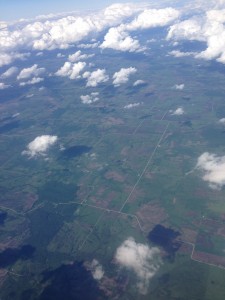
Bye, Iowa! As all the t-shirts say, “Wave next time you fly over.”




